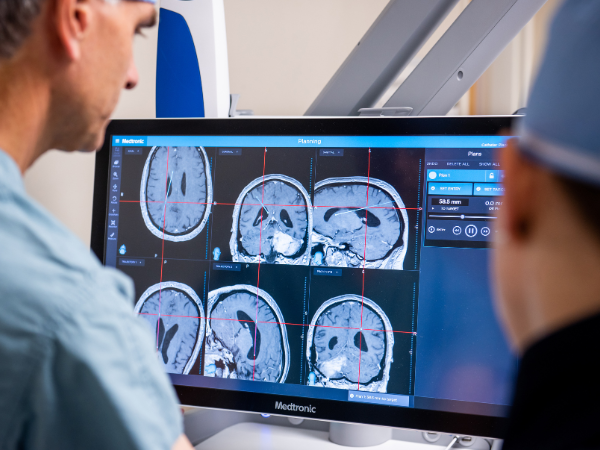Each May, Brain Tumor Awareness Month serves as a powerful reminder of the impact brain tumors have on individuals and families across the country and around the world. While some brain tumors are benign and slow-growing, others can be aggressive and life-threatening. Understanding the risks, symptoms and treatment options can help lead to earlier diagnosis and better outcomes. Here’s what you should know.
Brain tumors don’t always mean cancer—but they always matter
The National Brain Tumor Society defines a brain tumor as an abnormal growth of tissue in the brain or central spine that can disrupt proper brain function. Tumors can be benign (noncancerous) or malignant (cancerous), but even benign tumors can be dangerous depending on their size and location. They can compress healthy brain tissue, cause seizures or interfere with vital functions.
Tumors can also be categorized as primary or metastatic. Primary brain tumors originate in the brain, while metastatic tumors spread from cancers elsewhere in the body.
Symptoms aren’t always obvious
Brain tumor symptoms vary widely and can often resemble other common health conditions. Some symptoms develop gradually, while others appear suddenly. The most frequently reported signs include:
- Persistent headaches, especially those that worsen over time
- Seizures or convulsions without a prior history
- Difficulty speaking and understanding language
- Confusion or disorientation in everyday matters
- Numbness or weakness on one side of the body
- Personality changes or unusual behavior
Anyone experiencing any new, persistent, or unexplained symptoms should seek medical evaluation as soon as possible.
Support goes beyond medical treatment
Receiving a brain tumor diagnosis—whether benign or malignant—can affect all aspects of a patient’s life, from physical to emotional well-being. That’s why comprehensive care at UAB also includes support services like:
- Support groups for patients and caregivers
- Supportive classes and wellness guidance
- Cancer Patient and Family Advisory Council
Multidisciplinary care teams often include neurosurgeons, like brain tumor expert James Markert, M.D., MPH, neuro-oncologists, radiation specialists, physical therapists, palliative care physicians and social workers to provide holistic care throughout a patient’s treatment journey.
How you can participate in Brain Tumor Awareness Month
- Wear gray in support of brain tumor awareness
- Attend awareness events like the Blazer Bolt for Brain Cancer
- Encourage routine check-ups if you or a loved one experience persistent symptoms
UAB is leading the way in brain tumor care
UAB Medicine patients benefit from having a leader in brain tumor treatment right in their own backyard. As one of the nation’s top academic medical centers, UAB offers comprehensive brain tumor care through the Departments of Neurosurgery and Neurology and the O’Neal Comprehensive Cancer Center—the only NCI-designated cancer center in Alabama.
With internationally recognized specialists, advanced surgical techniques and a compassionate multidisciplinary care team, UAB is leading the fight against brain tumors in Alabama and beyond.
